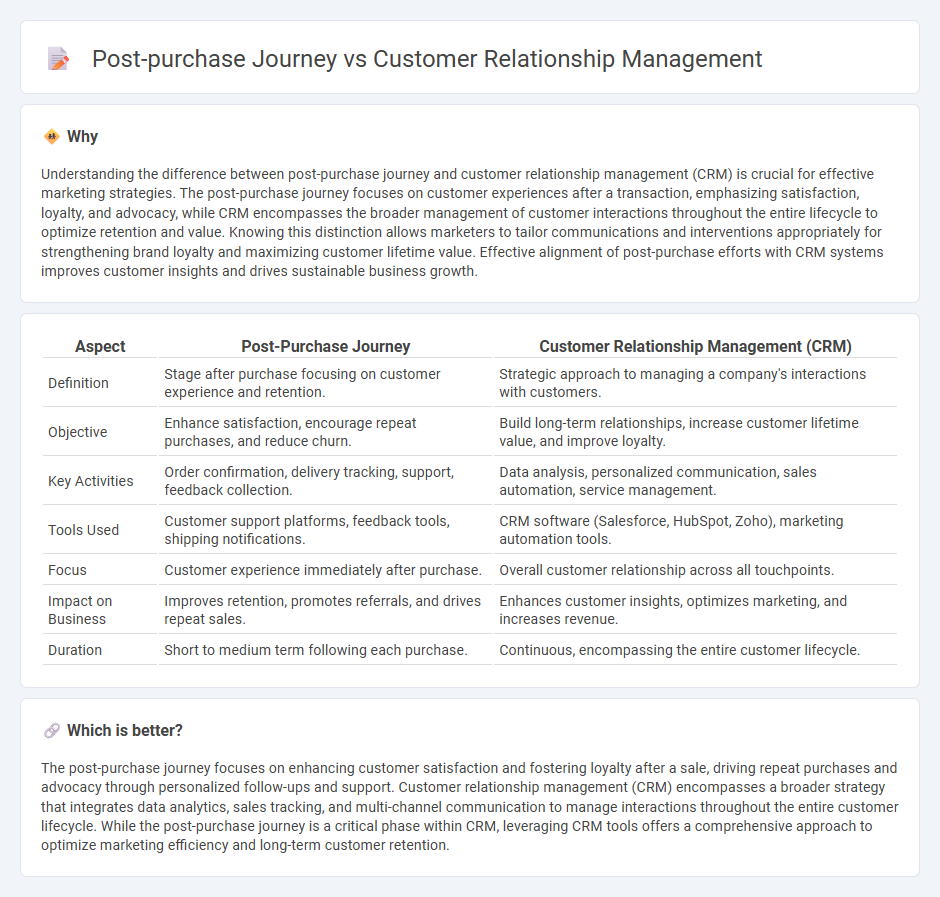
Post-purchase journey focuses on the customer experience immediately after a sale, emphasizing satisfaction, support, and engagement to foster loyalty. Customer Relationship Management (CRM) involves broader strategies and tools to manage long-term interactions, track customer data, and personalize marketing efforts across multiple touchpoints. Explore how integrating post-purchase journey insights with CRM systems can enhance overall customer retention and brand advocacy.
Why it is important
Understanding the difference between post-purchase journey and customer relationship management (CRM) is crucial for effective marketing strategies. The post-purchase journey focuses on customer experiences after a transaction, emphasizing satisfaction, loyalty, and advocacy, while CRM encompasses the broader management of customer interactions throughout the entire lifecycle to optimize retention and value. Knowing this distinction allows marketers to tailor communications and interventions appropriately for strengthening brand loyalty and maximizing customer lifetime value. Effective alignment of post-purchase efforts with CRM systems improves customer insights and drives sustainable business growth.
Comparison Table
| Aspect | Post-Purchase Journey | Customer Relationship Management (CRM) |
|---|---|---|
| Definition | Stage after purchase focusing on customer experience and retention. | Strategic approach to managing a company's interactions with customers. |
| Objective | Enhance satisfaction, encourage repeat purchases, and reduce churn. | Build long-term relationships, increase customer lifetime value, and improve loyalty. |
| Key Activities | Order confirmation, delivery tracking, support, feedback collection. | Data analysis, personalized communication, sales automation, service management. |
| Tools Used | Customer support platforms, feedback tools, shipping notifications. | CRM software (Salesforce, HubSpot, Zoho), marketing automation tools. |
| Focus | Customer experience immediately after purchase. | Overall customer relationship across all touchpoints. |
| Impact on Business | Improves retention, promotes referrals, and drives repeat sales. | Enhances customer insights, optimizes marketing, and increases revenue. |
| Duration | Short to medium term following each purchase. | Continuous, encompassing the entire customer lifecycle. |
Which is better?
The post-purchase journey focuses on enhancing customer satisfaction and fostering loyalty after a sale, driving repeat purchases and advocacy through personalized follow-ups and support. Customer relationship management (CRM) encompasses a broader strategy that integrates data analytics, sales tracking, and multi-channel communication to manage interactions throughout the entire customer lifecycle. While the post-purchase journey is a critical phase within CRM, leveraging CRM tools offers a comprehensive approach to optimize marketing efficiency and long-term customer retention.
Connection
The post-purchase journey is a critical phase in marketing that focuses on customer satisfaction, loyalty, and repeat business, closely intertwined with customer relationship management (CRM) strategies. Effective CRM systems collect and analyze data from the post-purchase interactions, enabling personalized communication, targeted offers, and proactive support that enhance the overall customer experience. This integration drives long-term engagement, increases customer lifetime value, and fosters brand advocacy by addressing customer needs promptly and accurately after the initial sale.
Key Terms
**Customer Relationship Management:**
Customer Relationship Management (CRM) centers on collecting, analyzing, and leveraging customer data to enhance personalized marketing, improve service quality, and build long-term loyalty. Effective CRM systems integrate sales, support, and feedback channels to streamline interactions and anticipate customer needs, driving higher retention rates and revenue growth. Explore how advanced CRM strategies transform your customer engagement and boost business performance.
Customer Data
Customer Relationship Management (CRM) centralizes customer data to streamline interactions, enabling personalized marketing and improved service efficiency. The post-purchase journey leverages this data to enhance customer satisfaction and foster loyalty through targeted follow-ups, feedback collection, and tailored offers. Explore how integrating CRM with post-purchase strategies can drive deeper customer insights and business growth.
Personalization
Customer Relationship Management (CRM) leverages data analytics and customer insights to tailor interactions and enhance personalization throughout the buying experience. The post-purchase journey emphasizes maintaining engagement and delivering customized content or offers based on previous purchases to increase loyalty and lifetime value. Explore detailed strategies to optimize personalization in both CRM and post-purchase phases for improved customer satisfaction.
Source and External Links
What is Customer Relationship Management (CRM)? - Talkdesk - CRM is a proactive approach to managing customer data, communication, and support processes throughout the customer lifecycle stages--from outreach and acquisition to conversion and retention--to transform buyers into long-term brand advocates.
What is CRM (Customer Relationship Management)? - TechTarget - CRM integrates practices, strategies, and technologies to manage and analyze customer interactions and data across multiple channels, improving customer service, increasing retention, and driving sales growth through operational, analytical, and collaborative CRM types.
What Is CRM? | IBM - CRM is a set of integrated technologies to document, track, and manage relationships and interactions with customers, supporting lead generation, sales pipelines, and enhancing customer experience through data-driven workflows and communication management.
 dowidth.com
dowidth.com